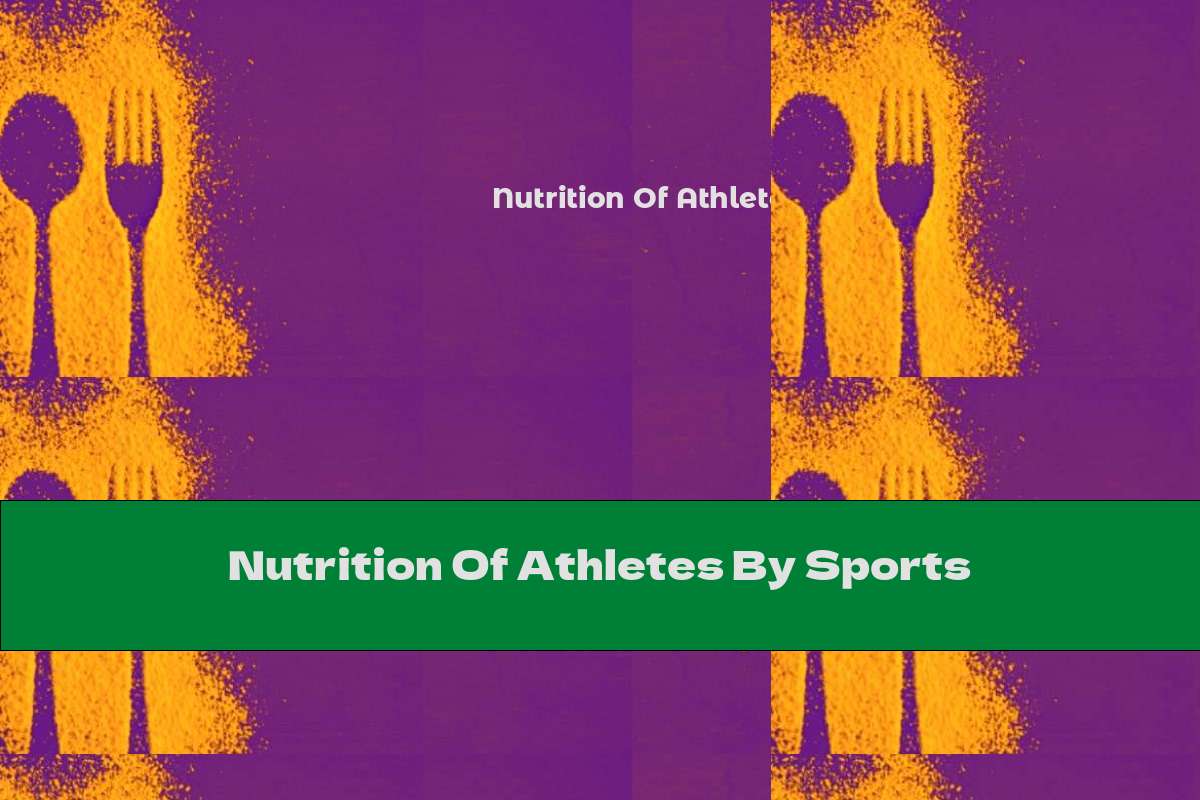Nutrition Of Athletes By Sports
 Author: Alexander Bruni
Time for reading: ~3
minutes
Last Updated:
February 21, 2026
Author: Alexander Bruni
Time for reading: ~3
minutes
Last Updated:
February 21, 2026

CHAPTERS (Table Of Contents)
Each type of sport makes its own demands on the human body, since it is impossible to adapt the nutrition of an athlete to some single model and consider that the work is done. For example, even a little extra fat will hinder a gymnast, but will not harm a weightlifter at all, or will not cause discomfort to a swimmer. In professional sports, the diet is selected individually, depending on the characteristics
Each type of sport makes its own demands on the human body, since it is impossible to adapt the nutrition of an athlete to some single model and consider that the work is done. For example, even a little extra fat will hinder a gymnast, but will not harm a weightlifter at all, or will not cause discomfort to a swimmer. In professional sports , the diet is selected individually, depending on the characteristics of a particular athlete - age, gender, weight and height, sports goals, etc. If we do not go into details, then at least we need to choose a diet depending on the type of sport , because with different types of load, we need various resources.
The traditional division of sports includes 4 main groups
-
Sports with minimal physical activity — chess, checkers . This group is characterized by not very large consumption of nutrients and calories - equal to the needs of a person engaged in mental work. The only requirement is easily digestible food.
-
Sports with short-term, but significant loads — gymnastics, acrobatics, equestrian sports , fencing, shooting, weightlifting, running up to 300 m. For athletes of these sports , the total energy expenditure is not great, but there are various requirements in terms of the need for nutrients. For example, stable body weight of the athlete is very important for equestrian sports or acrobatics , since the diet should prevent the athlete from gaining weight . But for those who do weightlifting, proteins are extremely important, and the second place is occupied by a sufficient amount of fat to give the body the necessary energy.
-
Sports with high intensity and volume of loads — swimming, wrestling, running 400-3000 m, all-around, sports games . This group combines both strength and endurance, since the diet should saturate the athlete 's body with good reserves of glycogen and material for building muscles. And those sports , where there are weight categories, set restrictions on weight gain.
-
Long -term sports — 10,000 m running and marathon, mountaineering, skiing, rowing, bicycle racing, sports walking. For such sports, the most important thing is endurance, which means that the body first of all needs carbohydrates. Also, do not forget about fats - unsaturated - as a source of energy.
Useful products by sports
Product name What is useful Who is it useful for Chicken breast / turkey breast Protein (up to 25%), vitamins B3, B12, PP, phosphorus, magnesium. Bodybuilders, powerlifters, athletes, basketball players, etc. Lean beef / rabbit meat Protein, vitamins of group B , iron, calcium, potassium, amino acids. Weightlifters, bodybuilders , boxers, gymnasts, swimmers, etc. Salmon Protein, the whole group of B vitamins, retinol, sodium, potassium, polyunsaturated fatty acids . Tuna Complete complex of omega-3 fatty acids, vitamins D, E, manganese, zinc. Powerlifters and other athletesfor whom building muscle mass is important. Seafood (shrimp, mussels, squid, etc.) Easily digestible protein, vitamins E, A, H, B4, carotene. Lovers of yoga, stretching, athletes who want to lose weight while maintaining This increases muscle mass. Homemade cheese. Casein, calcium, phosphorus, magnesium. Bodybuilders, wrestlers, football players, volleyball players, etc. choline, selenium, iodine, bifidobacteria, monosaccharides. Weightlifters, bodybuilders, fitness enthusiasts. Cheese Protein (up to 50%), saturated fatty acids, calcium, sodium, copper. Athletes, which are subjected to heavy loads on the muscles: crossfitters, dancers, cyclists, etc. Egg (chicken) Protein, vitamins A, E, thiamin, riboflavin, folic acid, iodine. Bodybuilders in the "drying" period, track and field athletes, volleyball players, boxers , etc. Nuts Polyunsaturated fatty acids, oleic, linoleic, palmitic, linolinoleic acids. Fitness people, weightlifters, wrestlers. Legumes (beans, chickpeas, lentils, peas) Ascorbic acid, vitamins PP, E, carotene, sulfur. Lovers of yoga, Pilates, sports types of sports , athletes participating in multi-sport. Buckwheat Minerals — iron, zinc, iodine, malic acid, easily digestible protein. Runners, cyclists, motor and motorcycle athletes, volleyball players. Whole grain flakes Food fibers, amino acids, sodium salts, vitamin C. Active lovers speciesathletes , football players, equestrians. Brown rice Folic acid, phosphorus, zinc. Mountain climbers, boxers, those who do aerobics. Green vegetables (spinach, lettuce, cabbage, green beans, cucumbers) Fiber, riboflavin, oxalic acid, vitamins C, K. All sports . Red vegetables (tomatoes, carrots, beets) Carotene, fiber, betaine, folic and ascorbic acids. Boxers, wrestlers, biathletes, swimmers. Fruits (citrus, unsweetened apples, pineapple) Fiber, pectin, vitamins C, E, R, potassium, magnesium .
Related Articles
- The Ultimate Guide to Hickory Smoked Bacon in Nutrition and Healthy Eating
- Fruitskewers in Honey Syrup: Nutritional Benefits and Recipes
- The Ultimate Guide to Buffer 500 in Nutrition: Benefits and Usage
- Nutritional Benefits of Fruit Skewers in Honey Syrup: A Delicious and Healthy Recipe
- Nutrition Guide: Fruitskewers in Honey Syrup - Benefits, Recipes, and More
Top Nutrition Articles Today
- . The Latest Food Pyramid: A Guide to Balanced Nutrition
- . Nutrition Guide: Importance of Food Pyramid, Meal Planning,...
- . The Role of Hydrochloric Acid in Digestion: A Comprehensive...
- . Libre2 Sensor Reset: Extending the Life of Your Glucose Sens...
- . The Power of Chalk in Nutrition: Benefits, Recipes, and Tips
- . All You Need to Know About E471 in Food: Functions, Foods, H...
- . The Essential Macronutrients of Beans: Protein, Carbs, Fiber...
- . The Nutritional Benefits of Quail: A Protein-Rich Superfood
- . List of Foods that Contain Carrageenan: A Guide to Avoiding...
- . Ascorbyl Palmitate: Benefits, Uses, and Precautions